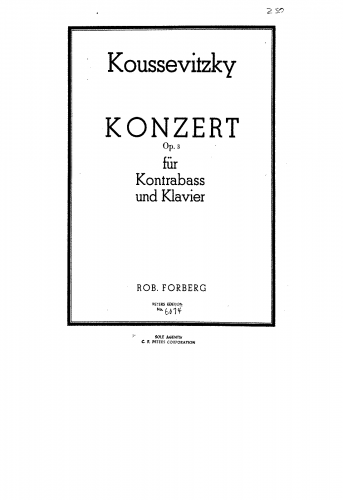Obscure Music Monday: Koussevitzky's Concerto for Double Bass and Orchestra
Serge Alexandrovich Koussevitzky (July 26, 1874 - June 4, 1951) was a Russian composer, conductor and double bassist. Born in to a musical family, his parents taught him violin, cello, piano, and trumpet. At 14 years old he won a scholarship to study the double bass at the Musico-Dramatic Institute of the Moscow Philharmonic Society, where he excelled in his studies.
At age 20 he joined the Bolshoi Theatre Orchestra, and became principal in 1901. He also made his double bass solo debut around this time in Moscow, and won critical acclaim for a recital he gave in Berlin in 1903. A year earlier he wrote a double bass concerto (with the help of Reinhold Gliere) and premiered it in Moscow in 1905. Not long after, Koussevitzky resigned from the Bolshoi, and moved to Berlin to study conducting. He would go on to conduct more extensively, while also working as a soloist, and eventually became conductor of the Boston Symphony.
Koussevitzky's Concerto for Double Bass and Orchestra is standard repertoire for the instrument; written by a double bassist, the work provides challenges both musical and technical. The first movement. An orchestral introduction starts the first movement off before the double bass comes in with an intense motif that quickly spans two octaves. It's later repeated and then morphs in to the main theme, which is expounded upon for a while. A triplet and sixteenth note theme/variation then comes along to provide for interesting listening and technical challenges for the double bassist. A sweeter theme riddled with accidentals follows, making for more challenges, but again, pleasing listening. Towards the ends the soloist has some fiendishly difficult sixteenth note double stops before the first movement moves seamlessly to the second movement, which has a very sweet and rich theme with a lot of chromaticism towards the middle development. The third movement starts identically to the first, though the development later on changes. The mood is intense, even when the work repeats the theme from the second movement, and then ends cheerfully, and abruptly.
Here are some recordings of this work for you to enjoy!



